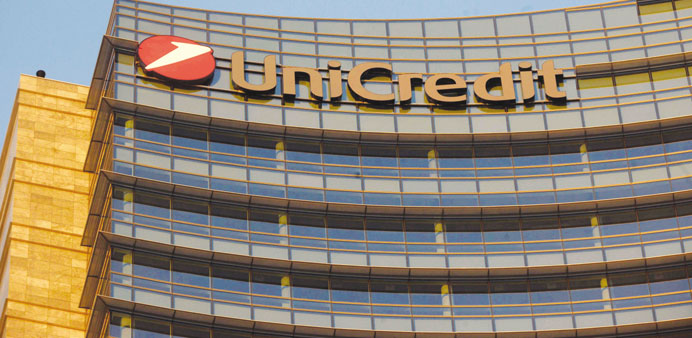UniCredit, Italy’s biggest bank by assets, is sticking to its full-year net profit target of €2bn despite a worsening economic outlook for its Italian home base.
UniCredit, Italy’s biggest bank by assets, is sticking to its full-year net profit target of €2bn ($2.6bn) despite a worsening economic outlook for its Italian home base, its chief executive said on Saturday.
Italian gross domestic product contracted 0.2% in the second quarter as a fall in investments dragged the country back into recession, according to the latest in a recent string of grim numbers for the eurozone’s third-largest economy.
UniCredit CEO Federico Ghizzoni said the bank’s business plan unveiled earlier this year was based on conservative estimates for Italy’s economy, adding the worse-than-expected data would not make much of a difference for the bank’s targets.
“We were expecting better (economic) numbers for 2014, but compared to our forecasts it’s not so different,” Ghizzoni told Reuters in an interview, adding the bank had pencilled in a forecast of 0.4-0.5% growth this year.
“So if it’s 0.2-0.3% the impact is not too much this year, so I am still confident about our numbers,” he said.
UniCredit posted a net profit of €1.1bn in the first half of the year. Ghizzoni said his bank was confident about the upcoming results of a Europe-wide health check of lenders, and did not see a “systemic problem” for Italian lenders as a whole.
“For us, we are confident that we have done a lot of restructuring in the past, so we are looking to the test in a very confident way,” he said.
“For the Italian banking sector we are not expecting a systemic problem but we cannot say that all the banks will pass the test, obviously it is possible but I don’t have enough information to this effect.”
He reiterated that UniCredit did not see any significant impact on its Russian operations in the short term due to tensions between Moscow and Ukraine and European sanctions against Russia.
“The immediate impact in term of revenues is very limited. For us the question is how much sanctions will impact on GDP growth. Probably some impact will come and we will have to see the impact on the banking sector.”
He said the Russian unit was very solid, had one of the highest capital ratios in the country and was a net lender to the overall group. “If I look at the net interest income in July year on year it has grown 18%, so I think we can manage the situation.”
Ghizzoni declined to comment on reports the bank had received offers to buy up to 50% of its asset management unit Pioneer from Spanish bank Santander, US private equity funds CVC Credit Partners – part of CVC Capital Partners – and Advent International. There has been speculation for months that Pioneer was up for sale or could be floated, with UniCredit repeatedly denying a sale was on the cards and saying it considered the unit of strategic importance to its business.
“If there is a partner or a proposal that will help the growth of Pioneer, that will accelerate the growth of Pioneer, we will consider it,” Ghizzoni said.
“What is constantly in the media about potential partners, names, we don’t comment on.”
The unit as a whole is worth €2bn, sources close to the matter have told Reuters, confirming the names of the three potential bidders. One source said it was unlikely that a decision would be made this month.

